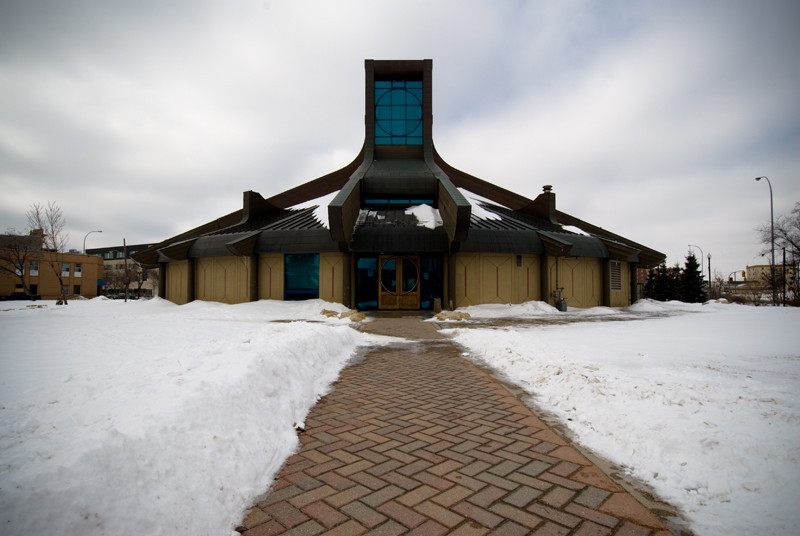Thunderbird House
A space for city’s indigenous community to learn and heal
The circular building topped with the head and wings of a massive metal thunderbird situated at 715 Main Street causes many newcomers to Winnipeg to stare.
Circle of Life Thunderbird House provides a much-needed venue for healing, teaching and community-building for First Nations people in the city.
“It’s a healing place for all people certainly, with a focal point for aboriginal people,” said executive director Stephanie Eyolfson.
Neeginan Development Corporation, a community-based company that responds to the development needs of Winnipeg’s First Nations community, created Thunderbird House roughly a decade ago.
Based on traditional lodges, the building’s architecture follows aboriginal teachings. Offices line the periphery of a high-ceilinged circular main area, filled with natural light.
“The circle is central to aboriginal culture,” Eyolfson said. “Everything is in a cycle and it represents that path.”
Thunderbird House’s name is also culturally significant. Traditionally, grandfather Thunderbird comes and cleanses mother Earth with rain, Eyolfson explained.
“That healing, that washing away and cleansing that needs to take place, that’s what Thunderbird House is all about.”
Thunderbird House fills an important void in the city, Eyolfson said. While aboriginal communities outside the city provide supportive places for traditional practices, city dwellers aren’t so lucky.
“It was for sure lacking in terms of a place to come together and celebrate traditional ceremonies in Winnipeg,” she said, a role that Thunderbird House fills nicely.
In a culture where First Nations people have endured the hardships of residential schools and other discrimination, a safe space to explore their culture is essential, Eyolfson said.
“Having that positive identity of aboriginal people reinforced is really important.”
Thunderbird House also exposes aboriginal youth to traditional teachings, said Don Robinson, a professor at the University of Manitoba’s faculty of social work and employee at the Ma Mawi Wi Chi Itata Centre (Ma Mawi).
Robinson also sits on the centre’s Elders Council, which provides spiritual guidance to the organization.
“In the past, elders taught young people in a circle. In the modern world we don’t have that kind of space now.”
That’s where Thunderbird House comes in.
“We try to work with the school divisions on providing a place where young people can learn, and connect young people to the elders,” Robinson said.
“It provides a place of transmission of culture and history.”
Thunderbird House holds regular sweat lodges, women’s and men’s sharing circles, drum and powwow workshops and sacred fires upon request.
These services are open to all.
The centre is planning an Earth Day cleanup and a community garden sporting vegetables and traditional medicines.
They are also partnering with local organizations on a number of pilot projects involving homeless people in the area.
“It’s really to focus on bringing forward this whole area and showing the residents, whether they have an address or not, that we care,” Eyolfson said.
Though Thunderbird relies on several local grants, most of its revenue comes from venue rentals. The centre is popular for government, community group and private functions, including workshops, meetings, funerals and wakes.
With strong community support, Eyolfson is confident Thunderbird House will remain a fixture in the community for generations.
“We’re here and we’re not going anywhere,” she said.
Published in Volume 63, Number 26 of The Uniter (April 2, 2009)








